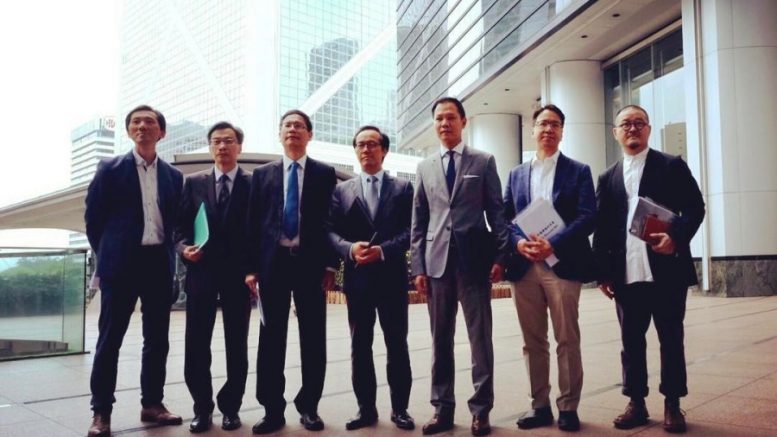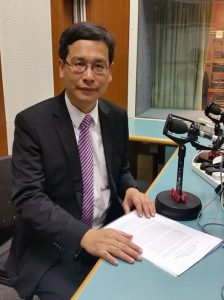By Ip Kin-kuen –
In less than 50 days, the new government will take office. The community is full of expectations tinged with doubts as to whether the new Government will be able to improve relations between the executive authority and the legislature.
Together with six other Legislative Council Members of The Professionals Guild, I had a meeting last Monday with Chief Executive-elect, Carrie Lam Cheng Yuet-ngor, for an exchange of views on the new Government’s guiding principles and concrete policies.
One of the main topics discussed was the improvement of relations between the executive authority and the legislature. Right at the outset, Mrs Lam made it clear that it was her wish to improve these relations. While there were no pleasant surprises in significant issues like re-launching the political reform, she did demonstrate a rather forthcoming and positive attitude in such areas as implementation of education policies, introduction of legislation on archives, and changing the roles of the Central Policy Unit. I think it was a good start.
Over the past five years, Leung Chun-ying’s Administration was characterized by political struggles, poor governance, prevalence of problems and extremely awful relations between the authorities and the legislature. Now with Carrie Lam as Chief Executive-elect, some of the officials have become relatively more relaxed and the atmosphere in political circles has also changed. However, the outgoing Leung Chun-ying remains ruthless, and there have been a succession of lawsuits targeted at Legislative Council members. He is also deliberately antagonistic even in non-political issues like Primary 3 TSA/BCA, sternly rejecting Mrs Lam’s call to shelve Primary 3 TSA this year and disdaining a joint signature appeal made by 36 cross-party Legislative Council members. Whatever the subjective intents of Leung Chun-ying are, the objective effects of his actions are nothing but the continuation of antagonism, difficult to fade.
To improve relations between the executive and the legislature requires the enhancement of mutual trust, which, in turn, necessitates the existence of an objective basis. Whether Mrs Lam and her team can achieve a breakthrough depends on whether they will be able to meet the three challenges set out below.
Respect core values
First, the new Government must respect society’s established core values and normal systems and procedures. People’s lack of trust in Leung’s Administration over the past five years has arisen from the Government ignoring established core values, excessively exerting its power and allowing, from time to time, the wishes of the Chief Executive to override normal systems and procedures. Incidents involving Hong Kong Television and the selection of a Pro-Vice-Chancellor of the University of Hong Kong are obvious examples. Advocating the rule of law and freedom and respecting systems and procedures are the cornerstones of Hong Kong’s society. They are indispensable
Mrs Carrie Lam herself should also draw lessons from the incident involving the construction of the Hong Kong Palace Museum, and attach importance to conducting consultations and being transparent. Only when the new team displays, once again, a proper governance style and exercise self-restraint can it gradually rebuild people’s trust and the Legislative Council’s trust in the Government.
Respect different political views
Secondly, the new Government must respect different political views and different camps in the Legislative Council. In fact, different camps and different political parties reflect the existence in society of a wide political spectrum. Respecting the views of different camps is, in practical terms, respecting the views of various quarters of society. Therefore, when members bring different voices and aspirations to the Legislative Council, the new Government should actively listen, respond quickly, and discuss with members how problems could be solved, instead of, as in the past, adopting an evasive, contemptuous or antagonistic attitude and even going so far as to seek, through judicial reviews, to abolish the seats of publicly elected Legislative Council members. Such a change will be a major step towards remedying the relations between the executive and the legislature.
Improve transparency
Thirdly, the new Government must improve its transparency, be willing to accept public scrutiny and conduct public consultations when formulating policies. In the past five years serving as a Legislative Council member, I often felt that the Government refused to provide detailed data and materials in respect of a number of policies, thus undermining members’ role in monitoring the work of the Government. Even if questions were raised at Legislative Council meetings, we still had officials giving irrelevant replies or ‘beating around the bush’.
For example, when I was earlier reviewing the budget, I asked Education Bureau to, as in the past, provide detailed information on vacant school premises. Much to my dismay, the authorities were deliberately evasive and refused to provide relevant information despite repeated requests. When it is difficult for Legislative Council members to obtain relevant information at Legislative Council formal meetings, you can easily appreciate the difficulties encountered by members of the public in their requests for information. At our meeting with Mrs Lam, she also agreed that being forthcoming with data and information has become an international trend and that the Government has a responsibility to enhance transparency and allow the public to have adequate information so that the public can meaningfully discuss with the Government the contents and directions of various policy issues. Not only will this enhance the participation of the public, it will also enable the Government to take on board their views when formulating policies and to establish amiable relations with the public.
Trust can only be established gradually. If Mrs Carrie Lam’s team can meet the three challenges mentioned above, relations between the executive authority and the legislature may thaw. One of the strategies adopted by Mrs Lam before taking office was choosing education, an area already enjoying the greatest amount of consensus, and attempting to break the impasse between the executive and the legislature by pledging to ask the Legislative Council to grant an extra HK$5 billion as recurrent expenditure on education. Undoubtedly, this is an astute move. In any case, improving relations between the executive and the legislature is not something that can be achieved overnight. In the 5-year team of the new Government, controversial issues are bound to come up sooner or later. Real improvement in relations between the executive and the legislature depends on whether both sides will be able to, amidst impassioned arguments, show mutual respect and refrain from casting doubts on each other’s motives.
The key lies, therefore, in the establishment of trust, and trust must have an objective basis. Only through really advocating Hong Kong’s established core values, upholding systems and procedures, respecting different camps in the Legislative Council, enhancing transparency and responding to people’s concerns would it be possible to restore people’s trust in the Government and to re-establish people’s confidence in the future of Hong Kong.
Ip Kin-kuen is legislator representing education functional constituency. This is his Letter to Hong Kong broadcast on RTHK 3 on May 14.
Photo: Pictures taken from Ip Kin-kuen and The Professional Guild Facebook



Be the first to comment on "Lam urged to build trust with lawmakers"